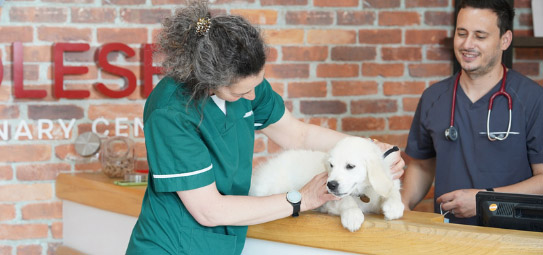
Winter Hydration Tips for Dogs, Cats and Small Furries from Vets in East Molesey
December 9, 2024
Staying hydrated is essential for your pet’s health, whatever the season. While it’s easy to associate water needs with hot, sunny days, cold weather poses unique risks for dehydration. Heating your home in winter can mean hot, dry air and low humidity, which can contribute to dehydration. At Molesey Vets, we want to ensure you have all the advice you need to help your dog, cat, rabbit or guinea pig stay hydrated and healthy this winter.
Contact us for tailored advice
Why do pets need hydration in cold weather?
Our vets in East Molesey explain that just like in the summer, water plays a crucial role in your pet’s body during winter. It helps:
- Regulate Body Temperature – Even in colder weather, pets need water to maintain a stable body temperature.
- Support Digestion – Proper hydration helps avoid issues like constipation, which can occur in winter when activity levels drop.
- Flush Out Toxins – Water keeps their kidneys healthy by aiding waste removal.
- Keep Joints Healthy – Hydrated joints are essential for older pets, especially in cold weather.
How much water should my pet be drinking this winter?
The approximate daily intake of water for adult pets should be:
- For Dogs and cats – 50–60ml of water per kilogram of body weight.
- For Rabbits – 50-150ml per kilogram of body weight.
- For Guinea pigs – 50-100ml.
Conditions like kidney disease or diabetes may lead to increased thirst, so it’s important to monitor your pet’s water intake and contact our vets in East Molesey if you notice any changes.
How to tell if your pet is drinking and how much? Our team at Molesey Vets suggest measuring your pet’s daily water amount and putting a mark on the side of their water bowl or bottle using a sticker, tape, or a drywipe pen. You will be able to then see if the water level is going down and your pet is drinking.
How to encourage your pet to drink
Pets may drink less when it’s cold because they feel less thirsty. Try these tips from our vets in East Molesey to ensure they stay hydrated:
- Keep water bowls clean and accessible – Place bowls in areas your pet frequents and check outdoor bowls aren’t frozen over.
- Offer warm water – Slightly warmed water can be more appealing on chilly days.
- Add moisture to their food – Wet food or water added to dry food can increase their intake. Some cats may drink less if they eat only wet food.
- Use pet fountains – Some pets prefer moving water, which can encourage them to drink more.
- Check water bottle are working – If you’re small pet uses a water bottle, check it daily for blockages and clean it regularly to prevent bacterial growth.
If you have two cats or dogs, a water bowl each next to their food bowl may help, but they’ll probably still drink each other’s. Try putting water in with your pet’s food too. For rabbits and guinea pigs, fresh hay and vegetables high in water content, like lettuce (avoid iceberg lettuce) and cucumber, also contribute to their hydration.
Spotting dehydration in pets
Even with your best efforts, dehydration can happen. Watch for these common signs in your pet:
- Dry nose or gums
- Lethargy or lack of energy
- Loss of appetite
- Sunken eyes
- Skin that stays tented when gently pinched and released (dogs and cats; less applicable to small furries)
- Sticky or thick saliva (more common in dogs and cats; harder to spot in small furries)
- Reduced urination (or darker-coloured urine)
- Cold extremities, such as paws or ears
- Weakness or wobbliness
When to seek veterinary advice
If you notice any of the above symptoms, make sure you contact us to book a vet appointment at our vet practice in East Molesey as soon as possible.
If your pet refuses to drink or shows signs of severe dehydration, don’t wait. Call us on 0208 979 1384 to arrange an urgent check-up.
By staying mindful of your pet’s hydration, even in the coldest weather this winter in Surrey, you can ensure they remain healthy and happy. As always, we’re here to help so if you have any questions about this topic or would like tailored hydration advice for your pet, please do get in touch.
Contact us for tailored advice



